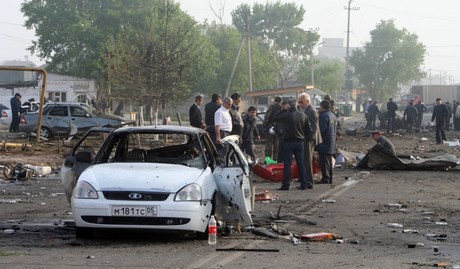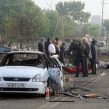
With Eye on Sochi, Authorities in North Caucasus Play Down Continuing Wave of Attacks
Publication: Eurasia Daily Monitor Volume: 10 Issue: 102
By:

The armed resistance movement in the North Caucasus has carried out suicide bombings ever since the start of the second military campaign in Chechnya. On June 4, 2000, a 22-year-old Chechen woman, Khava Baraeva, detonated an explosive-laden truck near a Russian military target, killing three Russian servicemen and wounding five others (www.youtube.com/watch?v=tDudIWBMZrs). Suicide bombers soon became the hallmark of the second war in Chechnya (www.kniga.com/books/preview_txt.asp?sku=ebooks319039).
Suicide attacks are condemned in the wider society and do not have mass support (https://groztrk.ru/religiya/%C2%ABranshe-smertnikov-horonili-so-svinyami%C2%BB). Still, the rebels have carried out such attacks over the past 14 years. Why? Suicide bombers in the North Caucasus do not actually inflict many casualties (www.newsru.com/russia/21aug2009/5terakts.html). So why do suicide bombers still attack, often killing as few as one or two police officers? Because those who send out suicide bombers understand that if the attack is successful, many people will die and their act of terrorism will receive much public attention. But even if the attack does not go as planned and only one or two police officers are injured or killed, the suicide attack will provide ideological support to the cause of the insurgency, as proof that it has people ready to die for the future victory of the jihadists.
Suicide bombers in the North Caucasus should be divided into those ready to blow themselves up for ideological reasons and those who are forced to do it in order to avoid being subjected to Russian justice. The most recent suicide bombing in Ingushetia was of the latter type. On May 17, during the search of a household of a suspected militant in the village of Ordzhonikidzevskaya in the republic’s Sunzha district, the suspect blew himself up (https://lifenews.ru/news/113949). He was not a classic suicide bomber ready to sacrifice himself, but simply blew himself up to avoid capture.
Unlike the May 17 incident in Ingushetia, the case of a female suicide bomber who carried out an attack in Dagestan on May 25 was a classic shahid (martyr) who attacked for ideological reasons. The terrorist attack took place in the central part of Makhachkala, near the main office of the Dagestani Ministry of Interior (www.gazeta.ru/politics/2013/05/25_a_5336157.shtml). The attack injured 15 people, five of them police officers. A woman wounded in the blast died later in the hospital (https://forum-msk.org/material/news/9918265.html). This was the second attack in Makhachkala within one week. Earlier, on May 20, two car bombs were detonated near the offices of the republican branch of the federal court bailiff’s service (www.tvc.ru/ShowNews.aspx?id=739131ac-b8cf-4a64-90de-000af733cf12). Two persons were killed in the blasts while 44 others were injured, including a three-year-old child (www.echo.msk.ru/news/1078092-echo.html.
Investigators identified the female suicide bomber who carried out the May 25 attack as 25-year-old Madina Alieva, widow of the militant Ali Aliev, who was killed in 2009. Alieva later married Kurban Japaev, who was also killed—in 2012 in the Dagestani city of Kaspiisk (www.sknews.ru/photo/62088-smertnica-podorvala-sebya-u-zdaniya-mvd-dagestana.html). Even though the bomb she detonated was relatively small, consisting only of an F1 hand grenade and other explosives carried in a handbag, the blast, which exploded with the force of half a kilogram of TNT, caused multiple injuries because of its location near the main offices of the Dagestani interior ministry (https://ria.ru/incidents/20130525/939463341.html).
Prior to the May 25 bombing, the most recent attack by a female suicide bomber in Dagestan took place on August 28, 2012, when one of the most powerful Sufi sheikhs, Said Efendi Chirkeiski, was killed (www.interfax.ru/russia/txt.asp?id=262655). Obviously, when sending shahids on such an operation, its organizers expect informational feedback rather than actual results in terms of large numbers of dead and wounded.
The investigation of the latest suicide bombing took an interesting twist. Even though in all likelihood it was an actual act of terrorist attack (www.russian-criminal-code.com/PartII/SectionIX/Chapter24.html), officials said the probe was launched under articles of the criminal code not covering acts of terrorism. Thus the officials refused to recognize the shahid’s attack as a terrorist attack. The investigation was launched under articles of the Russian criminal code including those covering an “attempt on the life of a law enforcement officer, an attempt on the lives of two or more people, using methods hazardous to the public; illegal arms possession, illegal manufacturing of an explosive device” (www.rg.ru/2013/05/25/reg-skfo/sk-anons.html).
The purpose of this bureaucratic understatement was apparently to shield the acting president of Dagestan, Ramazan Abdulatipov, from criticism. So it is likely that all the news out of Dagestan is being censored, something that could not have been done without Moscow’s consent.
Such control of the news is not new; it has been tried in Chechnya. An example was the attack by two suicide bombers in Grozny on August 6, 2012, that killed four Russian military servicemen and injured three others (www.neva24.ru/a/2012/08/06/Pri_terakte_v_Groznom_pog/). Yet during a meeting between Ramzan Kadyrov and Vladimir Putin on February 5 of this year, the Chechen leader said there had not been a single terrorist attack in the republic in 2012 (www.gazeta.ru/politics/news/2013/02/05/n_2740873.shtml). In the same vein of reporting, the leader of Ingushetia, Yunus-Bek Yevkurov, said that terrorist attacks and grave crimes had decreased by between 50 to 70 percent. The idea that there has been a decrease in the number of attacks in Ingushetia is dubious, given that nearly every week is marked by a large action by the insurgents or the killing by the security services of civilians suspected of ties to the rebels (www.kavkaz-uzel.ru/articles/218208/).
Therefore, it appears to be a general trend across the North Caucasus of news being withheld from the public, while the real situation remains dire. It is not hard to guess that as the 2014 Olympic Games in Sochi approach, the situation in the region will have to look not simply reasonable, but ideal. The Russian government will likely not spare any money to achieve that result as it reinterprets what actually constitutes a terrorist or suicide attack in order to convey an image of instability in the violence-prone North Caucasus.




